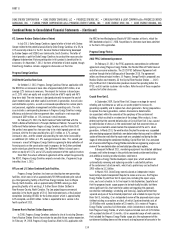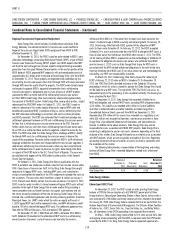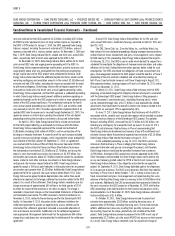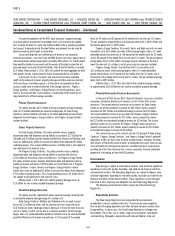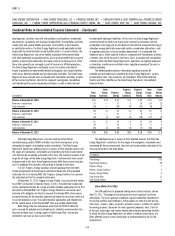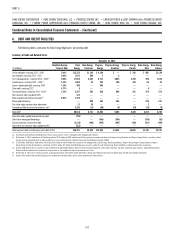Duke Energy 2012 Annual Report Download - page 163
Download and view the complete annual report
Please find page 163 of the 2012 Duke Energy annual report below. You can navigate through the pages in the report by either clicking on the pages listed below, or by using the keyword search tool below to find specific information within the annual report.
143
PART II
Combined Notes to Consolidated Financial Statements – (Continued)
DUKE ENERGY CORPORATION • DUKE ENERGY CAROLINAS, LLC • PROGRESS ENERGY, INC. • CAROLINA POWER & LIGHT COMPANY d/b/a PROGRESS ENERGY
CAROLINAS, INC. • FLORIDA POWER CORPORATION d/b/a PROGRESS ENERY FLORIDA, INC. • DUKE ENERGY OHIO, INC. • DUKE ENERGY INDIANA, INC.
Pursuant to regulations of the NRC, each company’s property damage
insurance policies provide that all proceeds from such insurance be applied,
fi rst, to place the plant in a safe and stable condition after a qualifying accident,
and second, to decontaminate the plant before any proceeds can be used for
decommissioning, plant repair or restoration.
Losses resulting from non-certifi ed acts of terrorism are covered as
common occurrences, such that if non-certifi ed terrorist acts occur against one or
more commercial nuclear power plants insured by NEIL within a 12 month period,
they would be treated as one event and the owners of the plants where the act
occurred would share one full limit of liability. The full limit of liability is currently
$ 3.2 billion. Effective April 1, 2013, NEIL will sublimit the total aggregate for all of
their policies for non-nuclear terrorist events to approximately $ 1.83 billion.
In the event of a loss, the terms and amount of insurance available
might not be adequate to cover property damage and other expenses incurred.
Uninsured losses and other expenses, to the extent not recovered by other
sources, could have a material effect on Duke Energy Carolinas’, Progress
Energy Carolinas’ and Progress Energy Florida’s results of operations, cash
fl ows or fi nancial position. Each company is responsible to the extent losses
may exceed limits of the coverage available.
Primary Property Insurance.
This policy provides $500 million of primary property damage coverage,
with a $2.5 million deductible per occurrence obligation, for Duke Energy
Carolinas’ nuclear facilities and with a $10 million deductible per occurrence
obligation for each Progress Energy Carolinas’ and Progress Energy Florida’s
nuclear facilities.
Excess Property Insurance.
For Duke Energy Carolinas, this policy provides excess property,
decontamination and decommissioning liability insurance of $2.25 billion for
Catawba and $1 billion each for Oconee and McGuire. Oconee and McGuire also
share an additional $1 billion insurance limit above their dedicated $1 billion
underlying excess. This shared additional excess $1 billion limit is not subject to
reinstatement in the event of a loss.
For Progress Energy Carolinas, this policy provides excess property,
decontamination and decommissioning liability insurance with limits of
$ 750 million on Brunswick, Harris and Robinson. For Progress Energy Florida,
this policy provides excess property, decontamination and decommissioning
liability insurance with limits of $ 750 million on Crystal River Unit 3. Progress
Energy Carolinas’ nuclear stations and Progress Energy Florida’s nuclear
station also share an additional $ 1 billion insurance limit above their dedicated
$750 million underlying excess. This shared additional excess $1 billion limit is
not subject to reinstatement in the event of a loss.
Effective April 1, 2013, NEIL will sublimit property damage losses to
$ 1.5 billion for non-nuclear accidental property damage.
Accidental Outage Insurance.
This policy provides replacement power expense coverage resulting from
an accidental property damage outage of a nuclear unit.
Duke Energy Carolinas’ McGuire and Catawba units are each insured
for up to $3.5 million per week, and the Oconee units are insured for up to
$2.8 million per week. Coverage amounts decrease in the event more than one
unit at a station is out of service due to a common accident. Initial coverage
begins after a 12-week deductible period for Catawba and a 26-week deductible
period for McGuire and Oconee and continues at 100 percent of the weekly
limits for 52 weeks and 80 percent of the weekly limits for the next 110 weeks.
The per accidental outage McGuire and Catawba policy limit is $490 million and
the Oconee policy limit is $392 million.
Progress Energy Carolinas’ Brunswick, Harris and Robinson units are each
insured for up to $3.5 million per week. Initial coverage begins after a 12-week
deductible period and continues at 100 percent of the weekly limits for 52 weeks
and at 80 percent of the weekly limits for the next 110 weeks. The per accidental
outage policy limit is $490 million. Coverage amounts decrease in the event
more than one unit at a station is out of service due to a common accident.
Progress Energy Florida’s Crystal River Unit 3 is insured for up to
$4.5 million per week. Initial coverage begins after a 12-week deductible
period and continues at 100 percent of the weekly limits for 52 weeks and at
80 percent of the weekly limits for the next 71 weeks. The per accidental outage
policy limit is $ 490 million.
Effective April 1, 2013, NEIL will sublimit the accidental outage recovery
to approximately $ 328 million for non-nuclear accidental property damage.
Potential Retroactive Premium Assessments.
In the event of NEIL losses, NEIL’s Board of Directors may assess member
companies retroactive premiums of amounts up to 10 times their annual
premiums. The current potential maximum assessments for Duke Energy
Carolinas are primary property insurance for $45 million, excess property
insurance for $42 million and accidental outage insurance for $22 million.
The current potential maximum assessments for Progress Energy Carolinas
are primary property insurance for $27 million, excess property insurance
for $ 32 million and accidental outage insurance for $19 million. The current
potential maximum assessments for Progress Energy Florida are primary
property insurance for $ 11 million, excess property insurance for $10 million
and accidental outage insurance for $6 million.
The maximum assessment amounts include 100 percent of Duke Energy
Carolinas’, Progress Energy Carolinas’, and Progress Energy Florida’s potential
obligations to NEIL for their share of jointly owned reactors. However, the other
joint owners of the jointly owned reactors are obligated to assume their pro rata
share of liability for retrospective premiums and other premium assessments
resulting from the Price-Anderson Act’s excess secondary fi nancial protection
program of risk pooling, or from the NEIL policies.
Environmental
Duke Energy is subject to international, federal, state and local regulations
regarding air and water quality, hazardous and solid waste disposal and other
environmental matters. The Subsidiary Registrants are subject to federal, state
and local regulations regarding air and water quality, hazardous and solid waste
disposal and other environmental matters. These regulations can be changed
from time to time, imposing new obligations on the Duke Energy Registrants.
The following environmental matters impact all of the Duke Energy
Registrants.
Remediation Activities.
The Duke Energy Registrants are responsible for environmental
remediation at various contaminated sites. These include some properties
that are part of ongoing operations and sites formerly owned or used by Duke
Energy entities. In some cases, the Duke Energy Registrants no longer own
the property. These sites are in various stages of investigation, remediation
and monitoring. Managed in conjunction with relevant federal, state and



